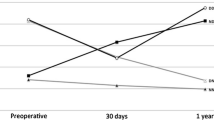Abstract.
A total of 73 patients underwent microdiscectomy for lumbar disc herniation between September 2001 and May 2002 at the Department of Neurosurgery of the Second University of Naples. Preoperatively and 3 and 6 months after surgery, patients were assessed on the Zung Self-rating Depression Scale (SDS) and on a visual analogue scale (VAS) for the subjective perception of pain. At 3 and 12 months, we found that patients with lower SDS scores (n=41) had a better outcome regarding pain than patients with relevant depressive symptoms (n=32). In agreement with the literature, our results confirm the negative role of depression in outcome after lumbar disc surgery. We emphasize the consideration of psychological factors in the management of lumbar disc herniation.
Similar content being viewed by others
Author information
Authors and Affiliations
Corresponding author
Rights and permissions
About this article
Cite this article
Arpino, L., Iavarone, A., Parlato, C. et al. Prognostic role of depression after lumbar disc surgery. Neurol Sci 25, 145–147 (2004). https://doi.org/10.1007/s10072-004-0248-x
Received:
Accepted:
Issue Date:
DOI: https://doi.org/10.1007/s10072-004-0248-x




